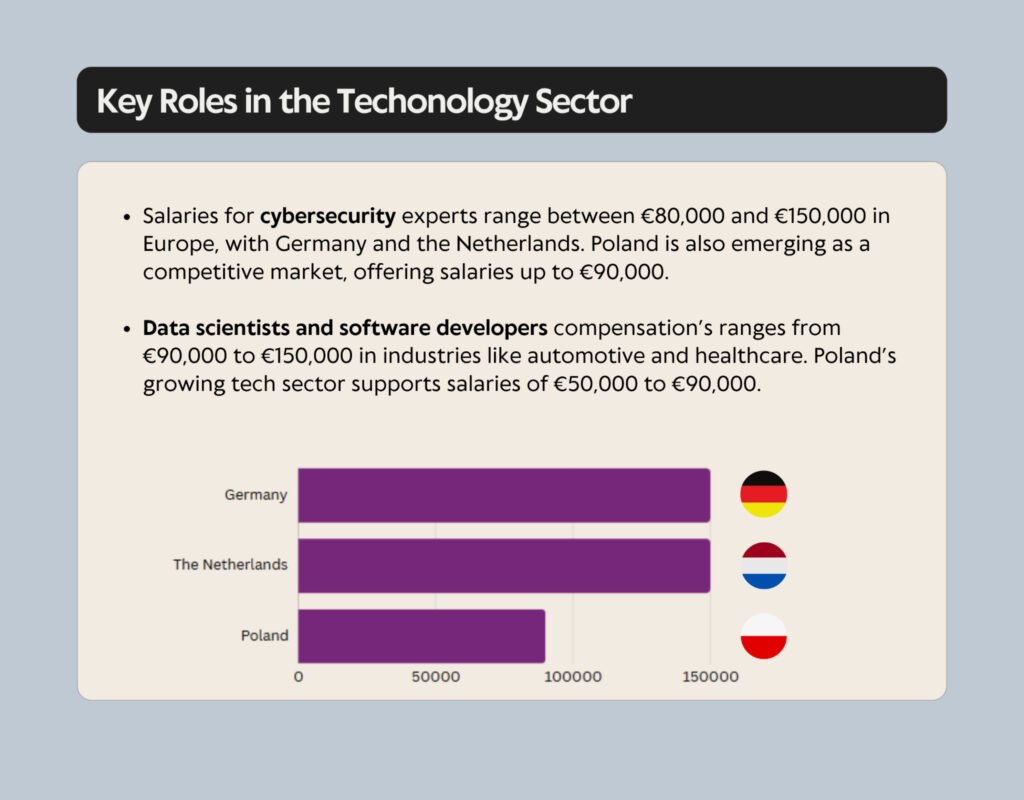Salary Guide 2025 for highly skilled professionals in Europe

As we approach 2025, salary dynamics across Europe are undergoing a significant transformation, driven by the interplay of economic stabilization, inflation rates, and shifting priorities in high-demand industries. European employers are forecasting moderate salary increases averaging 3-5% for non-promotional roles, reflecting a cautious approach to growth. However, in competitive sectors such as tech, healthcare, and engineering, early-stage companies are expected to offer salary hikes of up to 6.5% to secure top talent amidst intensifying skill shortages.
The evolving landscape of compensation highlights critical questions: how will these salary trends compare to previous years, and how do promotions factor into total pay growth? Competitive pay adjustments remain essential in attracting and retaining skilled professionals, especially as 69% of European tech companies cite uncompetitive compensation as their greatest hiring challenge, even above benefits and employer branding.
This article delves into the nuanced trends shaping salary increases in 2025, exploring industry-specific benchmarks, the role of real-time compensation data, and the balancing act between performance-based and market-driven pay adjustments. By leveraging comprehensive data, TheHRchapter aims to provide HR teams and employers with actionable insights to stay ahead in Europe’s dynamic talent market.
Key Sectors and Roles
The European job market in 2025 will focus on high-demand sectors like technology, healthcare, finance, and renewable energy, reflecting the rapid evolution of economic landscapes and societal priorities. These industries are at the forefront of innovation and sustainability, responding to challenges such as digital transformation, an aging population, and the global push for greener energy solutions.
a. Tech Sector
Salaries for cybersecurity experts range between €80,000 and €150,000 in Europe, with Germany and the Netherlands leading due to strong investments in tech hubs like Berlin and The Hague. Poland is also emerging as a competitive market, offering salaries up to €90,000 in cities like Warsaw and Kraków. Similarly, data scientists and software developers earn premium salaries, particularly in Germany and the Netherlands, where compensation ranges from €90,000 to €150,000 in industries like automotive and healthcare.

Startups across these countries are adopting hybrid compensation models, blending performance-based raises with inflation adjustments to attract talent. Germany, the Netherlands, and Poland are investing heavily in tech infrastructure, making them leading destinations for high-skilled professionals in the region.

c. Green Energy
The renewable energy sector is set to experience sustained growth through 2025, particularly in Northern Europe, where governments and corporations are heavily investing in sustainable infrastructure and energy transition projects. The global push for net-zero emissions by 2050 is driving the need for skilled professionals in solar, wind, and emerging renewable technologies, offering competitive salaries and long-term career opportunities.

Emerging trends, such as offshore wind in the North Sea, green hydrogen investments, and advancements in energy storage, are expected to create competitive salary offerings across Northern Europe. This growth is supported by government policies and subsidies promoting renewable energy innovation.
d. Healthcare and Biotech
The healthcare and biotech sectors in Europe are experiencing significant salary growth in 2025, driven by aging populations and increasing investments in innovation.
Germany stands out for its advancements in telemedicine and personalized medicine, offering salaries of over €100,000 for specialized physicians and €80,000–€150,000 for biotech researchers in areas like genetic therapies.
The UK, with its NHS and thriving private sector, is a leader in digital healthcare solutions, where mental health practitioners earn £60,000–£90,000, and biotech researchers in hubs like Cambridge exceed £100,000 annually.
Similarly, Sweden is prioritizing telemedicine, elder care, and bioinformatics, offering salaries of €55,000–€100,000, while France focuses on vaccine development and immunotherapy, with salaries ranging from €80,000 to €120,000.
The Netherlands continues to solidify its reputation as a hub for healthcare and biotech innovation, particularly in aging care and cellular therapy, with salaries between €90,000 and €140,000. Emerging trends such as telemedicine adoption, elder care specialization, and biotech advancements in genetic therapies and immunotherapy are driving consistent demand for professionals. These factors underscore Europe’s robust growth in healthcare innovation, with regional strengths shaped by government investments and a commitment to addressing demographic challenges.

e. Emerging Trends
Robotics, blockchain development, and tech sales are also growing areas of focus. Robotics engineers working on automation in manufacturing and healthcare could earn €80,000–€130,000. Similarly, blockchain developers and tech sales professionals will be vital in industries adopting decentralized technologies and advanced software solutions.
Regional Variations
Western Europe
Western Europe continues to lead in competitive pay scales, especially for high-skill roles, with robust economic environments and advanced industries.

Eastern Europe
Eastern Europe is closing the salary gap with Western Europe, particularly in IT, shared services, and back-office operations.

Eastern Europe is narrowing the salary gap with Western Europe by leveraging its lower cost of living and attracting tech and business service investments, driving faster salary growth. The tech sector is the primary catalyst for increases across the region, as the demand for digital transformation accelerates. Western Europe maintains high pay for skilled migrants through government thresholds, while Eastern Europe focuses on creating competitive roles in IT and shared services by attracting global companies.

We’re thrilled to introduce Coach4Expats’ exclusive online community—a dynamic hub designed to empower you with the tools, resources, and connections you need to thrive abroad.
✨ What’s in it for you?
Connect: Network with like-minded expats and build meaningful relationships.
Learn: Access insider tips, expert guidance, and practical resources for a seamless transition.
Grow: Share experiences, gain fresh perspectives, and elevate your journey.
Don’t wait—your expat adventure deserves the best support. Join our community todayand start building the life you’ve always envisioned.
Connect. Grow. Thrive. With Coach4Expats, success is just one step away!







